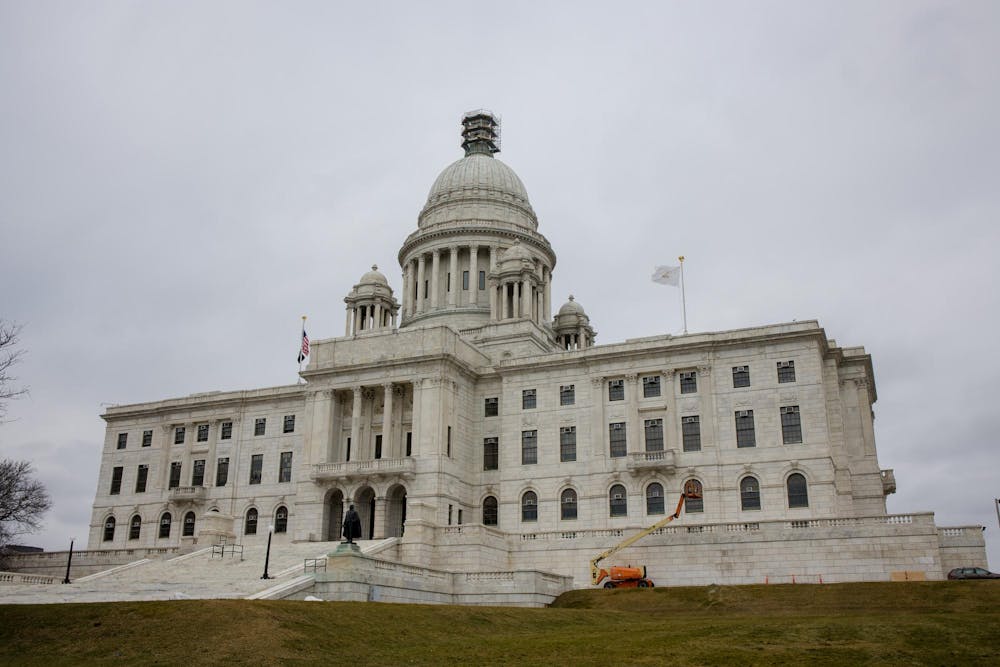Jan. 22 marked the 51st anniversary of Roe v. Wade, the Supreme Court’s 1973 landmark decision that established a nationwide protection on abortion.
This anniversary came nearly 19 months after the June 2022 Dobbs v. Jackson Women's Health Organization decision, which overturned federal protections on abortion provided by both Roe and the 1991 Planned Parenthood v. Casey decision.
Since the Dobbs decision, 14 states have enacted abortion bans, with several others adopting general restrictions. Conversely, 20 states have added protections of abortion since 2022, according to the New York Times.
Abortion remains legal in Rhode Island under the Reproductive Privacy Act of 2019, which codified the Roe decision into state law. The legislation protects an individual’s right to terminate their pregnancy up until the stage of fetal viability — when the physician “has determined that there is a reasonable likelihood of the fetus' sustained survival outside of the womb with or without artificial support.”
Following the stage of viability, abortion is only permitted in cases where termination is necessary to save the mother’s life.
51 years of reproductive rights in R.I.
While modern abortion protections in Rhode Island “demonstrate a strong commitment by the General Assembly to (protect) reproductive freedom, it was not always that way,” Steven Brown, executive director of the American Civil Liberties Union of Rhode Island, wrote in an email to The Herald.
Despite Roe’s national protections, “for decades, the (state) legislature was openly hostile to abortion rights and passed a number of laws … designed to restrict abortion,” Brown added.
Immediately after Roe’s 1973 ruling, the Rhode Island Criminal Abortion Statute was passed. The statute restricted abortion on the grounds that “human life begins at the moment of conception and that such life is a person within the meaning of the Fourteenth Amendment.”
But, weeks later, the U.S. District Court for the District of Rhode Island ruled against the statute in the case Doe v. Israel, citing the Supreme Court’s decision in Roe.
Between the late 1970s and 1990s, the state legislature passed several other restrictive policies, including statutes requiring spousal notification, mandating informed and parental consent, restricting insurance coverage and prohibiting partial birth abortions.
Many of these statutes were deemed unconstitutional by federal and state courts — and thus not legally enforceable — but remained in law.
The state’s reproductive health protections were not streamlined until 2019, when the legislature passed the Reproductive Privacy Act. That year, Rhode Island became one of four states to pass new explicit protections of reproductive rights.
“We knew it was important to make sure that abortion was safe and legal in R.I. in case it would have been overturned at the federal level,” State Representative Karen Alzate (D-Pawtucket, Central Falls), who co-sponsored the act, wrote in an email to The Herald.
The RPA, authored by former State Representative Anastasia Williams, explicitly protects the right to terminate a pregnancy up to viability. It also repealed previous state prohibitions on partial birth abortions — citing the Supreme Court’s 2007 decision in Gonzales v. Carhart — as well as requirements for spousal notification. The statutes mandating informed consent and parental consent remain.
But, the RPA faced challenges at the General Assembly. According to Alzate, there were a mixture of amendments proposed to the legislation. These amendments ranged from establishing a 24-hour waiting period for individuals seeking an abortion to adopting measures that criminalized fetal homicide, The Herald previously reported.
“Some were technical and others felt like (an) attack on women,” Alzate wrote.
The bill ultimately passed without amendments. “Due to this bill, Rhode Island will remain resolute in ensuring a woman’s privacy in making her own health care decisions,” said Williams in a press release. “We will not turn back the clock on decades of progress for female reproductive health equality.”
The RPA proved significant when the Supreme Court handed down the Dobbs decision in 2022.
“Because of the signing of the Reproductive Privacy Act here in 2019, access to reproductive healthcare has not changed meaningfully in Rhode Island, despite the national shift regarding Roe v. Wade,” Joseph Wendelken, public information officer for the Rhode Island Department of Health, wrote in an email to The Herald.
Even when the RPA safeguards protected abortion after the Dobbs decision, state leaders have made additional efforts to bolster reproductive rights.
Less than two weeks after the Dobbs decision, Governor Dan McKee enacted Executive Order 22-28, protecting out-of-state individuals who obtain abortions in R.I. from facing prosecution in other states. It also legally protects R.I. healthcare providers who perform abortions for such patients.
Since Dobbs, the General Assembly has also passed legislation which expands abortion access to disadvantaged communities. In May 2023, the state legislature passed the Equality in Abortion Coverage Act, which provides individuals on Medicaid with insurance coverage for abortion care.
According to a June 2023 KFF fact sheet, roughly one quarter of Rhode Islanders are enrolled in Medicaid. Additionally, Medicaid covers 26% of women aged 18 to 49 in the state.
According to House Majority Whip Katherine Kazarian (D-East Providence), who sponsored the bill, the EACA builds on previous progress made by the RPA. “The Reproductive Privacy Act … ensured that Rhode Islanders’ rights were protected under state law when the Supreme Court overturned Roe v. Wade,” she said in a press release.
“With passage of the Equality in Abortion Coverage Act today, we will complete that work, providing genuine equality and access for everyone in Rhode Island who needs reproductive health services,” Kazarian added.
The future of abortion post-Dobbs
As Rhode Island explores ways to protect access to reproductive healthcare, national advocates for abortion rights have also launched new initiatives in response to political opposition.
On the 51st anniversary of Roe v. Wade, the Biden-Harris administration announced plans to convene the fourth meeting of the Task Force on Reproductive Healthcare Access — a task force charged with strengthening access to reproductive healthcare.
Vice President Kamala Harris’s Fight for Reproductive Freedoms tour also began on Jan. 22. The tour is a nationwide series of events aiming to “bring together thousands of people to fight for the freedom of every American to make decisions about their own body,” according to a White House press release.
“Currently in the Republican-controlled House of Representatives, we are working to hold the line against Republican proposals to ban abortion,” wrote Representative Seth Magaziner (D-R.I.) in an email to The Herald.
The Life At Conception Act was reintroduced by Representative Alex Mooney (R-W.V.) in January 2023. The act declares that “preborn” children hold a right to life and would significantly impact abortion at the national level.
“Respecting human life from the moment of conception until natural death is not simply a religious belief, it is a scientific fact that life begins at conception,” Mooney wrote in a press release.
On Roe’s anniversary, Magaziner, who is cosponsoring two pieces of reproductive rights legislation, published a press release.
“I’m a proud cosponsor of the Ensuring Women’s Right to Reproductive Freedom Act, which prohibits women from being punished when traveling across state lines for reproductive health care,” Magaziner wrote. “Women deserve the right to choose whether to have an abortion, no matter where they live in our country.”
As the Supreme Court prepares to hear a case on the constitutionality of abortion pills in March, some local and national leaders have criticized the Court’s shift against reproductive rights protections.
According to Brown, “the complete rejection and abandonment of a constitutional right that had been relied on for almost a half century … did great harm to the notion of the Court as a protector of individual freedoms.”
For Magaziner, people should “find hope in the fact that the ultimate power in our country does not lie with any court,” he wrote. “It lies with the people … We have the power to restore and protect fundamental rights by organizing, voting, running for office and participating in the democratic process.”

Tom Li is the editor-in-chief and president of The Herald's 135th editorial board. He is from Pleasanton, California and studies economics and international and public affairs. He previously served as a metro editor, covering the Health & Environment and Development & Infrastructure beats, and has worked on The Herald's copy editing, editorial page board, design and podcast teams.





